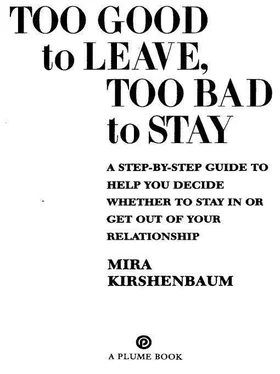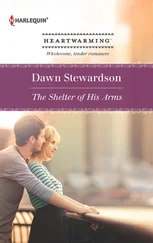Kirshenbaum, Mira - Too Good to Leave, Too Bad to Stay
Здесь есть возможность читать онлайн «Kirshenbaum, Mira - Too Good to Leave, Too Bad to Stay» весь текст электронной книги совершенно бесплатно (целиком полную версию без сокращений). В некоторых случаях можно слушать аудио, скачать через торрент в формате fb2 и присутствует краткое содержание. Жанр: Психология. Описание произведения, (предисловие) а так же отзывы посетителей доступны на портале библиотеки ЛибКат.
- Название:Too Good to Leave, Too Bad to Stay
- Автор:
- Жанр:
- Год:неизвестен
- ISBN:нет данных
- Рейтинг книги:3 / 5. Голосов: 1
-
Избранное:Добавить в избранное
- Отзывы:
-
Ваша оценка:
- 60
- 1
- 2
- 3
- 4
- 5
Too Good to Leave, Too Bad to Stay: краткое содержание, описание и аннотация
Предлагаем к чтению аннотацию, описание, краткое содержание или предисловие (зависит от того, что написал сам автор книги «Too Good to Leave, Too Bad to Stay»). Если вы не нашли необходимую информацию о книге — напишите в комментариях, мы постараемся отыскать её.
Too Good to Leave, Too Bad to Stay — читать онлайн бесплатно полную книгу (весь текст) целиком
Ниже представлен текст книги, разбитый по страницам. Система сохранения места последней прочитанной страницы, позволяет с удобством читать онлайн бесплатно книгу «Too Good to Leave, Too Bad to Stay», без необходимости каждый раз заново искать на чём Вы остановились. Поставьте закладку, и сможете в любой момент перейти на страницу, на которой закончили чтение.
Интервал:
Закладка:
But once Fran saw how little Jerry had to offer her, she was able to see past her respect for him as a person and face the real concrete fact that her not wanting him as an ex-husband meant to her that she didn’t want him as a husband.
Here’s the guideline. The context is your thinking about what it would actually be like to live without your partner, on each individual day and for years at a time.
GUIDELINE #27
If it’s clear to you that you wouldn’t lose anything you couldn’t do without if your relationship were over, then your partner doesn’t have anything real to offer you and he’s not a resource for you. Even if your partner does provide things, if what he provides are things you don’t particularly respect him for, he’s not a respected resource for you. Most people in this situation were happy when they left the relationship. Quick take: There’s no need to keep something you wouldn’t miss if it were gone or that you don’t value when you’ve got it.
This guideline has an importance that’s easy to overlook. We all need help. You and I both need as many resources in our lives as possible. If you live with someone who is simply not a resource for you in any important way, then not only are you living with whatever other problems are going on that make this relationship iffy, but you’re depriving yourself of the possibility of spending your life with someone different who could really be a resource for you.
There’s good news in this guideline. It shows why our partners don’t have to be rich and famous and successful for us to love them and have a good relationship with them. It’s only who our partners are to us that matters.
15
Who’s Sorry Now?
Issue: Hurts and Betrayals
LINGERING HURTS
People in relationships do things that hurt their partner all the time. They do them accidentally. They do them deliberately. They do them once. They do them over and over. There’s almost no relationship that hasn’t had to digest its share of hurts, grievances, and betrayals. The things people do to hurt each other include everything from buying their partner a dorky anniversary gift to sleeping with their wife’s sister.
That’s the end of the spectrum we’ll focus on here: the damaging end, the things people do like having affairs that cause tremendous pain and introduce the risk of lasting damage. We’ll focus on the stuff that all too often breaks people up.
This is where we’ll deal with affairs and other “crimes” from the past that linger in the present. This chapter is specifically addressed to you if you or your partner has done something really hurtful and damaging and you’re wondering whether it should break you up. Perhaps you’re wondering if it’s broken you up already. Or can you survive this, even though you still feel the pain and experience the damage?
But you need to know that a lot of your questions about past hurts have already been answered:
• If the damage was so bad that you’ve actually already decided to leave, you’ve learned that in the “It’s Too Late, Baby” chapter.
• If your partner makes it impossible for you to talk about what happened by taking things off the table or has destroyed your ability to trust him by lying, you’ve learned that in the “Talk to Me” chapter.
• If the damage is ongoing as a result of your partner’s need for power, you’ve learned that in the “You’ve Got a Hold on Me” chapter.
• If the love between you has been destroyed, you’ve learned that in the “What Is This Thing Called Love?” chapter.
• If the sensual part of your relationship was destroyed, you’ve learned that in the “It Don’t Mean a Thing If It Ain’t Got That Swing” chapter.
• If the damage to your relationship comes from a problem your partner has, you’ve learned if there’s a basis for his solving that problem in the “All the Things You Are” chapter.
• If whatever happened simply crossed your bottom line, you’ve learned that in the “Let’s Call the Whole Thing Off” chapter.
• If you’ve not been able to accept the fact that the damage is unhealable because you’ve been mistakenly afraid of what awaits you if you leave, you’ve learned that in the “If Ever I Should Leave You” chapter.
• If the damage actually reflects unbridgeable differences between you, you’ve learned that in the “You Say ‘Tomayto,’ I Say ‘Tomahto’” chapter.
• And if the damage destroyed your ability to respect each other, you’ve learned that in the “R-E-S-P-E-C-T” chapter.
So you can see how far you’ve come! If you’ve learned that you’ll be happiest leaving, you can see how powerful the forces are that have made this relationship too bad to stay in. If you’ve gotten no indication so far that you should leave, you can feel happy about how strong your relationship must be to have survived the possible disasters I’ve just listed. So if by this point one of you did something to hurt the other and yet it’s still not clear to you that you’ll be happiest leaving, then that’s a good sign all by itself. But you’re still looking for more clarity. You still need to resolve once and for all whether the damage was too great or whether you can get past it.
Not Just Affairs
Affairs are of course the classic form of hurt and betrayal that damages relationships. But there are many other things people do to cause this level of damage.
Here are some examples:
• One woman who’d grown up in a poor, disadvantaged family gave a dinner party for her husband’s boss and colleagues. Perhaps because he was embarrassed by her lack of polish, her husband made joking but humiliating references to her cooking, her clothes, and other things he knew that she felt insecure about. Her sense of hurt and betrayal lasted for years.
• An opportunity had come up for both a woman and her husband to go back to school and finish their degrees. This seemed like a perfect time for them to have a baby, but only because the husband promised he would contribute a full fifty percent of the childcare. But, claiming he was too busy, he contributed almost none of the childcare, and her studies suffered.
• One man had been saving money so he could quit the job he hated and go into business for himself. Even though his wife knew about his plans and how important they were to him, she gave his savings to her father when he had some money troubles. Not only was her husband furious at his future being stolen from him, but his sense of betrayal was deepened by his knowing that his wife’s father had abused her when she was a child.
These stories and all the others like them have in common that one person did something in the past to hurt the other and there’s still some kind of wound or damage years later.
We’re only going to focus on the hurt and betrayal from the past that may make this relationship too bad for you to stay in now—the thing that was done a year ago or ten years ago that still carries with it suitcases full of bitterness and anger, where you and your partner are still fighting over how terrible a thing it was and whether forgiveness is possible.
DAMAGE AND HEALING
How do you measure how big and terrible the damage is from something someone did in the past? Here’s one reason why it can be so difficult to assess the damage.
Let’s say you’re in the copy room of your office with a colleague and you accidentally step on your colleague’s foot. You jump back in embarrassment and say, “Oh, I’m so sorry.” And your colleague quickly says reassuringly, “Oh, it was nothing.”
Читать дальшеИнтервал:
Закладка:
Похожие книги на «Too Good to Leave, Too Bad to Stay»
Представляем Вашему вниманию похожие книги на «Too Good to Leave, Too Bad to Stay» списком для выбора. Мы отобрали схожую по названию и смыслу литературу в надежде предоставить читателям больше вариантов отыскать новые, интересные, ещё непрочитанные произведения.
Обсуждение, отзывы о книге «Too Good to Leave, Too Bad to Stay» и просто собственные мнения читателей. Оставьте ваши комментарии, напишите, что Вы думаете о произведении, его смысле или главных героях. Укажите что конкретно понравилось, а что нет, и почему Вы так считаете.












